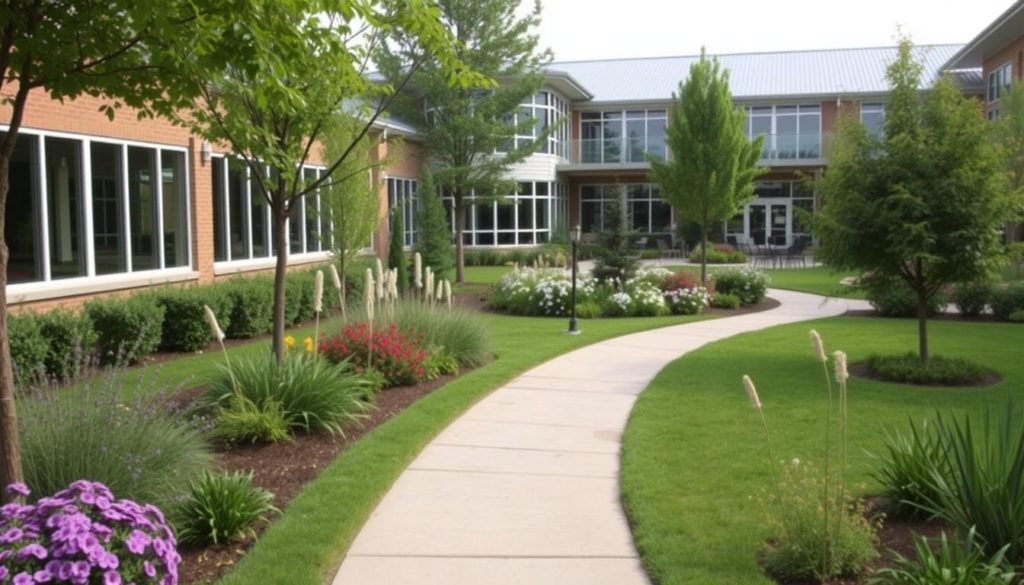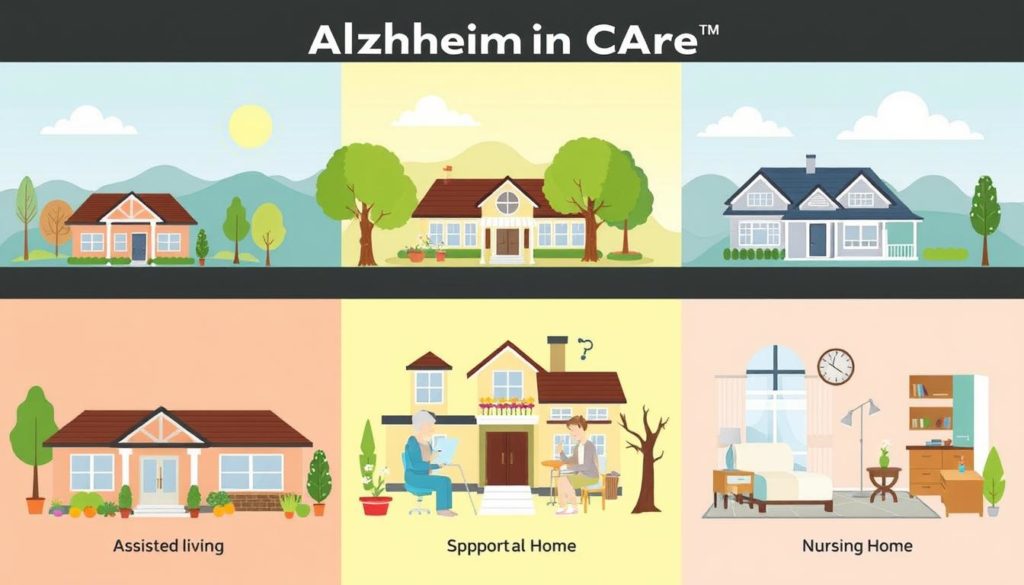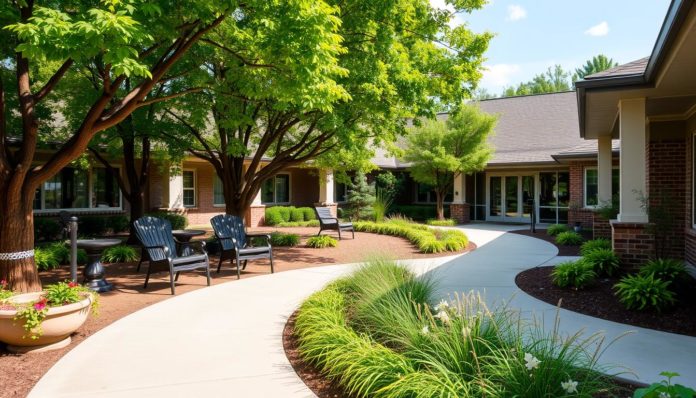Over 5.8 million Americans live with Alzheimer’s disease today. Families find it tough to pick the proper memory care facilities. This choice is critical as Alzheimer’s progresses, demanding constant supervision.
This guide simplifies finding top Alzheimer Care Facilities. It focuses on individual needs and the support these places provide.
Understanding Alzheimer Care Facilities: What You Need to Know
When looking into Alzheimer’s care, it’s important to know the different facility types. These facilities cater to various dementia stages, offering from basic to full medical care.

Types of Alzheimer Care Facilities
There are many Alzheimer’s care options:
- Retirement Housing: Perfect for those in early stages of memory issues.
- Assisted Living: Provides both freedom and dementia care services.
- Nursing Homes: Offer full medical and personal care.
- Alzheimer’s Special Care Units: Focus on high-level dementia care services.
- Life Plan Communities: Offer different care levels, adapting as needs evolve.
Key Features of Successful Alzheimer Care Units
Great Alzheimer care units have several key features:
- Homelike Comfort: They’re designed to feel warm and welcoming.
- Privacy: They offer private spaces for respect and comfort.
- Specialized Staff: A team trained in memory loss and dementia care.
- Comprehensive Services: They include therapeutic activities and tailored care plans.
- Family Communication: They provide regular updates to families.
Knowing these aspects helps find the right care services. It makes sure your loved one gets the best support on their journey.
Types of Residential Care for Alzheimer’s Patients
Choosing the right care for Alzheimer’s patients is very important. Each kind has benefits suited for different disease stages and needs. Here, we’ll look at some popular choices.
Retirement Housing
Retirement housing works well for those in Alzheimer’s early stages. Residents can live with some independence in these communities. They offer activities that engage the mind but not specialized Alzheimer’s care.

Assisted Living
Assisted living for seniors with Alzheimer’s is a good middle option. It provides support like medication help, meals, and personal care. There are also social activities designed for those with Alzheimer’s.
Nursing Homes
Nursing homes provide around-the-clock care and medical help. They’re meant for Alzheimer’s patients in advanced stages who need constant care.
Alzheimer’s Special Care Units (SCUs)
Alzheimer’s Special Care Units specialize in dementia care. They have trained staff and a secure, structured environment. This helps minimize confusion and keep residents safe.
Life Plan Communities
Life Plan Communities change care levels as needs change. They offer everything from independent living to nursing care. This allows residents to stay in the same place as their needs grow.
Making the right choice depends on understanding these options. This can ensure the best living situation for loved ones with Alzheimer’s.
Choosing the Right Memory Care Facilities
Choosing the right memory care facility involves several steps. It’s important to make sure it matches your loved one’s needs. Factors like staff training and care plans play a big role.
Factors to Consider
When looking for Alzheimer Care Facilities near me, consider these key points:
- Staff Qualifications: Ensure the staff is trained in dementia care services.
- Care Plans: Verify if individualized care plans are available.
- Family Involvement: Check how family members are involved in the care process.
- Staffing Ratios: Know the caregiver-to-resident ratio for adequate care.
- Program Diversity: Look for a variety of therapeutic activities to engage residents.
- Quality of Life: Assess the overall living conditions and environment.
- Safety Measures: Confirm the presence of robust safety protocols.
- Meals: Evaluate the nutritional quality and meal variety provided.
- Payment Options: Understand the costs and available payment plans.
Questions to Ask Potential Facilities
Asking the right questions is crucial in your search. Keep these inquiries in mind:
- What specific dementia care services does your facility offer?
- Can you provide examples of customized memory care plans?
- How often can family members visit and participate in care meetings?
- What is the current staffing ratio, and how is it managed during emergencies?
- What types of therapeutic activities and engagements are available?
- How do you ensure a high quality of life for residents with dementia?
- What are the safety measures in place to prevent wandering and accidents?
- How are the meals prepared, and are dietary restrictions accommodated?
- What payment options or financial assistance programs do you offer?
To make a solid choice, do unannounced visits and surveys at the facilities. This helps ensure you’re picking a top-quality Alzheimer Care Facilities near me.
What to Expect from Specialized Alzheimer’s Care
When looking for Alzheimer’s care, families can expect a range of structured support. This includes plans tailored to each individual, therapeutic activities, and strong safety measures. These elements work together to offer full care.
Individualized Care Plans
Memory care facilities provide residents with personalized care plans. These plans meet their unique needs, ensuring focused attention. They’re regularly updated to reflect any changes, offering both medical and emotional support.
Therapeutic Activities
Therapeutic activities are key in Alzheimer’s care. Residents enjoy things like music therapy, art sessions, and brain games. These activities aim to keep the mind active while providing fun.
Environment and Safety Measures
Safety is a top priority in memory care settings. Facilities have secure areas and controlled entry to prevent wandering. The design also helps reduce confusion and make residents feel at home.
| Aspect | Details |
|---|---|
| Individualized Care Plans | Customized to each resident’s needs, continually updated |
| Therapeutic Activities | Music therapy, art sessions, cognitive exercises |
| Environment and Safety | Secured perimeters, monitored entries, familiar settings |
Navigating Financial Considerations
Planning for Alzheimer’s care puts finance at the forefront. Understanding expenses and payment methods can ease stress. In this discussion, we focus on understanding costs of Alzheimer Care Facilities and examining payment options through Medicare and Medicaid.
Understanding Costs and Payment Options
Reviewing the costs of Alzheimer Care Facilities requires looking at all fees. This includes room and board, medical care, and more. Out-of-pocket costs can be high, urging families to review Alzheimer’s care payment options.
Seeking advice from an elder care lawyer is often beneficial. They help with financial planning for long-term care.
Medicare and Medicaid in Alzheimer Care
Medicare usually doesn’t cover long-term costs but does offer limited medical benefits. Meanwhile, Medicaid is vital for qualifying individuals. It’s important to know coverage and application steps for both to secure the best financial plan for Alzheimer’s care.
Exploring financial factors and comparing facilities aid in smart choices. This ensures care for loved ones without excessive financial worry.
Benefits of Assisted Living for Seniors with Alzheimer’s
Assisted living offers many benefits for those with Alzheimer’s. It’s often better than other care options like memory care. A key advantage is the chance for more social interaction. Being social helps maintain mental health and can slow down cognitive decline.
Enhanced Socialization and Support
People living in these communities get special support for their Alzheimer’s. They enjoy social events and daily activities that create a sense of community. Caregivers make sure activities match what residents like and can do. This adds even more support.
Access to Medical and Health Services
Access to medical care is another major benefit. Assisted living offers many health services, including managing medication. This eases stress for families. Plus, medical staff on-site means quick help with any health issues. This keeps residents safe.
Choosing between assisted living and memory care is tough. But knowing the benefits of assisted living helps families decide. Learn more about the differences between assisted living and memory care.
Finding Alzheimer Care Facilities Near Me
Finding the right Alzheimer’s care facilities can seem hard. But, many online tools and community resources make it easier. These resources help families find good care options that meet their needs.
Using Online Tools and Resources
The internet offers many dementia care resources. Sites like the Alzheimer’s Association’s community resource finder let people check facility certifications, compare services, and learn about local care. This helps families make good choices from home.
Community Resource Finders
Community resource finders are key in finding Alzheimer’s care places. They have databases, maps, and user reviews to give a full view of options. They show nearby places and give info on the quality of care. This helps families pick the best care for their loved ones.
| Online Tool | Features | Benefits |
|---|---|---|
| Alzheimer’s Association Community Resource Finder |
|
|
| AARP Care Directory |
|
|
Using online resources and community finders makes finding Alzheimer’s care easier. Whether planning a visit or just dropping in, these tools give families what they need. They ensure families can choose the best care for their loved ones.
Coping with the Transition to an Alzheimer Care Facility
Moving to an Alzheimer Care Facility can be tough emotionally. It’s important to focus on giving the best care to your loved one. At the same time, handle your feelings of guilt or doubt. It’s key to talk openly during this time. Try to include the person with dementia in these talks as much as you can.
Finding support groups or online communities helps a lot during this stressful time. They offer a space for family members and caregivers to share and learn from others in similar situations. For tips on making the transition easier, check out resources like this website.
To ease into the memory care facility, give the staff detailed info on your loved one’s likes, daily routine, and medical needs. This helps them to offer care that feels more personalized. Such tailoring can make the change easier for everyone.
Don’t forget to take care of yourself too. Take breaks when you need to, seek counseling if it helps, and be patient with yourself. Knowing how to handle setbacks is part of the process. Stay committed to your decision, keeping your loved one’s wellbeing in mind. This approach will help both of you adjust better.
Alzheimer’s Support Services for Families
There are many support services to help families dealing with Alzheimer’s. These include 24/7 helplines for immediate assistance. The Alzheimer’s Association is one key resource, offering ongoing support. This means families can get help anytime they need it.
An Alzheimer’s online community can be very helpful. It’s a place to share advice and experiences. On sites like AlzConnected, people can talk about their challenges. They can also find support and understand they’re not alone.
Knowing the care team for dementia is essential. Families should learn about the doctors, nurses, and therapists who help. Using technology can keep you connected, even from afar. This helps make sure support is always there.
FAQ
What types of Alzheimer Care Facilities are available?
Many types of Alzheimer Care Facilities exist. They range from retirement housing for early-stage care to assisted living facilities. They also include nursing homes and Alzheimer’s Special Care Units (SCUs). Each one offers different levels of care as the disease progresses.
What are the key features of successful Alzheimer Care Units?
Successful Alzheimer Care Units share common features. They provide a homelike setting and privacy. They have specialized staff and offer dementia care services. They ensure clear communication with families and create a safe space for those with memory loss.
What should I consider when choosing a memory care facility?
When choosing a memory care facility, consider the staff’s qualifications. Look into the facility’s treatment programs and how they handle changing needs. Think about care plans, family involvement, staffing ratios, and program diversity.
Consider the residents’ quality of life and environmental safety. Also, assess meal quality and the various payment options.
What kinds of therapeutic activities are provided at these facilities?
Memory care facilities offer various therapeutic activities. These activities include cognitive exercises and physical activities. They also have art and music therapy, and social engagements. All are aimed at maintaining cognitive function and enhancing quality of life.
How do Alzheimer Care Facilities ensure resident safety?
To ensure resident safety, Alzheimer Care Facilities take several steps. They secure the units and use clear signage. The layout is designed to prevent wandering. Plus, they have staff trained to constantly monitor and assist residents.
What are the costs associated with Alzheimer Care Facilities?
The costs of Alzheimer Care Facilities vary widely. It’s important to explore all payment options. Check out-of-pocket expenses, Medicare, and Medicaid. Understanding long-term financial planning and eligibility for aid is crucial.
What benefits does assisted living offer for seniors with Alzheimer’s?
Seniors with Alzheimer’s find many benefits in assisted living. They get chances for enhanced socialization and access to health services. They also get help with managing medication, engaging activities, and skilled caregiver support. These are all vital for slowing cognitive decline and easing family stress.
How can I find Alzheimer Care Facilities near me?
To find nearby Alzheimer Care Facilities, use online tools and resources. The Alzheimer’s Association’s community resource finder is a good place to start. It provides details on facility certifications and local support options. It also helps you plan visits or do spontaneous drop-ins for assessments.
What should families expect during the transition to an Alzheimer Care Facility?
Transitioning to an Alzheimer Care Facility can stir up strong emotions in families. It’s common to feel guilt or doubt. But focusing on the necessary care is key. Involving the person with dementia in decisions helps. Seeking support from online or local groups can also aid in managing the transition.
What support services are available for families of those with Alzheimer’s?
Families have access to various support services. There are helplines, online communities, and local support groups. These provide advice, peer support, and information. They help families understand care team roles and offer strategies for effective caregiving, including from a distance.


